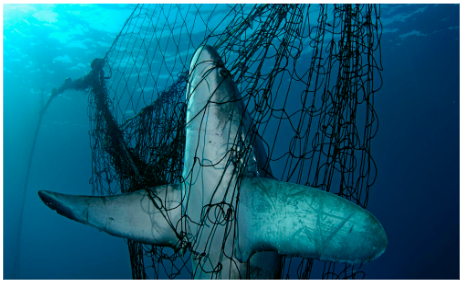Have you always associated sharks with the movie Jaws? Do you perceive these fish as frightening underwater beasts? Well, sharks have always been labeled as predators who should be feared, and are thought of as monsters who will kill anything or anyone in sight. The truth is, this stereotypical view is absolutely wrong. Sharks are actually the victims in many situations, which is a result of constant overfishing and illegal hunting. As stated on World Wildlife Fund, “There were only five shark-related human deaths in 2018 compared to tens of millions of sharks killed annually by people. Sharks are in all the world’s oceans, but shark attacks are extremely rare.” It is more probable for a person to be struck by lightning than to be bitten by a shark.
Ever since the 19th century, sharks have been killed for the benefit of people. In 1917, the Ocean Leather Company started the most drastic era of shark exploitation. This company would fish for these innocent creatures because of the increasing demand for their fins, which can be used in traditional foods, such as shark fin soup (very popular in China and surrounding territories), as well as in medicine. Usually, after a shark was caught and its fins were cut off, fishers would return it to the water, often still alive. Since they would have no way of swimming, the fish would tragically die. Other reasons as to why sharks are still hunted is because they are often caught as bycatch, meaning they are unintentionally captured by fisherman who mean to catch other marine wildlife and are then discarded. But, most devastatingly, sharks are being killed simply because of the fear humans have of them. Since they are being put to death so quickly, all shark species aren’t able to restore their population at the same pace. Generally, sharks produce a very small amount of offspring, and it takes them several years to grow and mature. This continuous slaughter has made sharks one of the most endangered on the planet, with one-third of their species already threatened with extinction, according to the IUCN Red List of Threatened Species.
Sadly, many people don’t know that sharks are crucial to the marine ecosystem. Shark populations are essential for a thriving marine environment. Decreasing their population causes a loss in food and biodiversity. Lastly, sharks don’t even eat humans. If a human ever got “attacked” by a shark, it is most likely because the shark mistaked the human as its prey. They may make this mistake because water near the coast is usually murky, causing the shark to get confused by the person’s movement and clothing. But once the shark bites, it typically leaves the person alone after realizing that they’re not prey, which gives the human enough time to safely make it to land. Additionally, sharks are very curious creatures, and they always use their mouths when investigating unfamiliar objects, which can result in a bite.
There are many ways in which communities can take a part in helping these innocent victims and increasing their population size. You can always watch and make sure that the seafood you are eating is sustainably sourced. Other ways to help are by using less plastic and cleaning debris. It is also possible to donate or adopt a shark through the Shark Research Unit’s conservation! These are all ways of protecting sharks and the water environments that they live in.
While there are always great challenges in working hard to preserve these animals, there is always hope as well. Together, we can stop the sharp decline of sharks and let its population thrive for years to come.
Works Cited:
Edmonds, Molly. “Shark Myths vs. Facts: Discover the Truth About These Predators.” World Wildlife Fund, https://www.worldwildlife.org/stories/shark-facts-vs-shark-myths. Accessed 6 November 2024.
“15 Ways To Save Sharks.” Shark Angels, https://sharkangels.org/ways-to-save-sharks/. Accessed 6 November 2024.
“Memories of Sharks Past.” NOAA Fisheries, 9 August 2014, https://www.fisheries.noaa.gov/feature-story/memories-sharks-past. Accessed 6 November 2024.
Pallardy, Richard, and Kenny Chmielewski. “Why Do Sharks Attack?” Britannica, https://www.britannica.com/story/why-do-sharks-attack. Accessed 6 November 2024.
“Shark Conservation Media Guide.” Paul G. Allen Family Foundation, 20 March 2024, https://pgafamilyfoundation.org/news/2023/global-shark-conservation. Accessed 6 November 2024.
“Threat to Sharks.” Hawaiʻi Sharks, https://dlnr.hawaii.gov/sharks/about-sharks/threats-to-sharks/. Accessed 6 November 2024.

 Anxiety: The Silent Disease That's Killing Our Youth
Anxiety: The Silent Disease That's Killing Our Youth